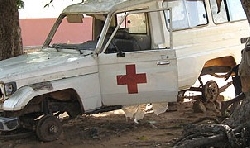
Contact: David Wightwick, Medical Emergency Relief International (Merlin) Assessment Team, +44 (0) 20 7014 1600
LONDON, May 31 /Standard Newswire/ -- Ndélé hospital in the Central African Republic (C.A.R.) highlights only too starkly the crisis which is slowly crippling this part of the continent. This is the fifth poorest country in the world, where, according the United Nations, one million people are in need of emergency help. Yet as I walked around the semi-derelict hospital compound, I found only four patients.
Photo: Defunct equipment and unaffordable charges mean few people get help at
We arrived with Samuel Bozonoke who was suffering from a strangulated hernia. A nurse there was able to perform a basic operation that saved his life. Afterwards he added up the cost of the treatment, which included drugs, syringes, suture material, soap, and even the fuel for the generator, and the bill came to £45. That's several months' salary for a government employee and as much as a farmer might earn in a year. There are no organisations in town to help treat those who can't afford these fees.
But it's not just the cost of treatment that's keeping people away. Most of the wards and consultation rooms I saw were filthy and bare of equipment. In the "emergency unit", a lone stretcher was propped up in the corner of the otherwise empty room. The wards were furnished with nothing more than empty bed frames. And it was clear the hospital's only ambulance wasn't going to bring any more cases in. It lay on the ground outside, its body work slowly rusting away and its four wheels long since disappeared.
Sporadic rebellions in C.A.R. have forced hundreds of thousands of people to leave their homes. But there are no big camps where displaced people congregate, as in neighbouring
Travelling on from Ndélé, we visited a string of rural clinics on the day-long journey to Kaga Bandora. People along this stretch of the road had moved back to their villages, but news was circulating that the rebels may return.
None of the sites we inspected had properly trained staff or functioning equipment and all were short of up-to-date drugs. The high costs, and poor quality, of services provided at these clinics mean that people only go there as a last resort. They rely instead on "bush medicines" which are ineffective against malaria and HIV. It's no wonder that one in five children in C.A.R. die of preventable illnesses, and one in 15 women die in childbirth.
Merlin is appealing for funds to help strengthen primary health services in this much neglected country. It would mean the clinics I visited could have properly trained staff and adequate supplies of medicines. And, until the economy improves, they would offer free care for those who need it.
But we face a real challenge getting people to take notice of the needs there. If C.A.R. is a country that few people have heard of, it's also a crisis that most are able to ignore.




 Sign Up to Receive Press Releases:
Sign Up to Receive Press Releases: